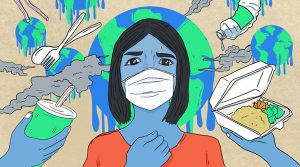Amidst a global pandemic, unrest in Ukraine, the challenges of climate change, and daily World News events, it’s safe to say that many of us are experiencing a growing sense of anxiety. Let’s face it: The current state of this planet can be frightening to the overall well-being of the preponderance of all generations. But, as societies progress, we see immense strides towards mitigating climate change. While the world experiences the consequences of taking more than giving, it is forced to fight back in the forms of policy change, spreading awareness, implementing new laws, and making individual day-to-day changes; but it does not suffice- we are desperate for more action.

Developing countries are the most adversely affected and vulnerable to the broad decisions of the developed world. During times of crisis, such as natural disasters, people of the developing world are more prone to experiencing the harsh effects because of factors such as widespread poverty, lack of resources, increased vector-borne diseases, etc. I’d like to believe that anyone who is able to emphasize, become enlightened on the severity of these issues. However, awareness is closely associated with heightened anxiety. The first step of coping with this anxiety is recognizing that your feelings are more than valid. Some deal with this anxiety and in turn exacerbate the situation by burdening themselves with the sole blame of what’s happening. The reason being stems from the “…misinformation that has been put on individual people versus systems of power and corporations”1
There are ways to redirect the shame and self-hatred to passion and ambition. We ultimately cannot control intrusive thoughts that creep in, but we can control our perception towards them and if and how we act upon them. Take past and current generational mistakes as guidance to a better future. Try your best not to dwell. Start by creating solutions. Do your part and inspire others to do too. If we, as a collective, make these habitual, we are moving in the right direction: use reusable shopping bags, DIY projects, upcycle, recycle, compost, grow your own fruits and vegetables, support local businesses, buy second-hand, pick up litter, advocate for change, donate to reputable, sustainable organizations – the list goes on. It is quite the challenge to be completely ‘green’, so please, do not be so hard on yourself. Also, stay mindful of the fact that two-thirds of anthropogenic carbon emissions originated in just ninety companies and government-run industries 2. Yes, producers need to be held responsible for their actions; however, creating a narrative that only places guilt and consequences rather than finding solutions is only going to keep us in an unproductive cycle. With that being said, keep producers accountable by not buying from eco-unfriendly sources and calling out the polluters.

On the brighter side, – pun not intended- countries are beginning to do their part in climate action. Colombia has implemented thirty ‘green corridors’, which provide bikeable and walkable lanes to civilians with shade in mind3. This not only betters the mental health of Colombian citizens, but also reduces temperatures in Medellin- their second-largest city. Leader in Climate Action and an overall sustainable country, Denmark has committed to eradicate the exploration of oil and gas by the year 2054. They pledged to use those funds to train employees in greener technologies. During the 2019 Climate Action Summit, countries gathered from all over the globe to discuss and propose plans to save this Earth we share. While the biggest greenhouse gas emitters: United States of America, China, and India made little to no commitments to reduce emissions, countries such as Argentina, Turkey, Norway, and Ethiopia came together to strengthen their Nationally Determined Contributions (NDC’s).

Nevertheless, there are many ways you can call for action to our leaders. The first and possibly most overlooked one is signing petitions that you feel connected to. Start at the local level and educate yourself on the matters of your city. Ideas For Us provides access to issues that are occurring from local to global levels. You can also attend local town hall meetings and presentations. Share what you’re learning with others and work as a collective to create and then execute those solutions.
Regardless, try to keep doing your part as an individual, a citizen, a friend, a family member, and a being of this beautiful Earth of ours. Boost your mental health and get outside!
Sources
- American Psychological Association. (n.d.). Speaking of psychology: How to cope with climate anxiety, with Thomas Doherty, PsyD, and Ashlee Cunsolo, Phd. American Psychological Association. Retrieved March 3, 2022, from https://www.apa.org/news/podcasts/speaking-of-psychology/eco-anxiety
- Starr, D. (n.d.). Just 90 companies are to blame for most climate change, this ‘carbon accountant’ says. Science. Retrieved March 3, 2022, from https://www.science.org/content/article/just-90-companies-are-blame-most-climate-change-carbon-accountant-says
- Foundation, T. R. (2021, August 4). Colombia’s Medellin plants ‘green corridors’ to beat heat. news.trust.org. Retrieved March 3, 2022, from https://news.trust.org/item/20210728130018-qufqy/
- Why Denmark wants to be a ‘frontrunner’ in the fight against climate change. Yale School of the Environment. (2021, September 28). Retrieved March 3, 2022, from https://environment.yale.edu/news/article/why-denmark-wants-to-be-a-frontrunner-in-fight-against-climate-change








